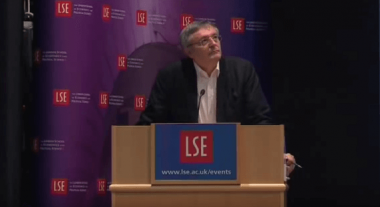Why an atheist philosopher is one of our century's greatest prophets

When you stop and think about it, some of the most significant figures in the Bible are outsiders. People who weren't part of the Israelite nation, people who weren't supposed to carry authority – those of other or even 'rival' faiths...
From the Old Testament character of Ruth, to the Magi who visited Jesus and His parents, to the Good Samaritan, those who were on the outside have often had important lessons for the people of God.
This remains true into the present day. One of the most effective philosophers I have ever read is John Gray. His writing about God, human nature and the limits of atheism mean he's in some ways a very astute theologian. His political predictions have seen him hailed as something of a 21st Century prophet. This may well be surprising, given he is also an atheist.
Gray's atheism is of a very different order to the high priests of the New Atheism though. Indeed he has been among the most savage critics of Richard Dawkins, Sam Harris and Daniel Dennett and the shaky basis of their intellectual project. "Dawkins, Hitchens and the rest may still believe that, over the long run, the advance of science will drive religion to the margins of human life, but this is now an article of faith rather than a theory based on evidence," he says.
What distinguishes Gray's atheism is the rigour he subjects it to – and the way he unflinchingly looks at the consequences of an atheistic worldview. "None of the divergent values that atheists have from time to time promoted has any essential connection with atheism, or with science," he argues. "How could any increase in scientific knowledge validate values such as human equality and personal autonomy? The source of these values is not science. In fact, as [Nietzsche]... argued, these quintessential liberal values have their origins in monotheism."
Having held academic positions in both the United States (including at Harvard and Yale) and the United Kingdom (Oxford and the London School of Economics) he is well versed in the culture of both countries – and the way in which religion has been a force for good and ill on both sides of the Pond.
Gray's thought has spanned different areas of political and moral philosophy. He began his career critiquing the prevailing liberal thought of the giant of 20th Century American philosophy – John Rawls – and moved on in his most recent work to examine the vexed philosophical question of free will.
However, it is in his work on 'progress' that has had the largest impact – remorselessly attacking a shibboleth of the Western mindset – namely that humans are gradually getting more advanced, becoming in some sense 'better' and, given enough time, will arrive in Utopia (or as near as makes little difference).
The title of a collection of Gray's articles on this subject sums his argument up perfectly: "Heresies: Against Progress and other Illusions." His thought was developed in his best selling works Straw Dogs and Black Mass. Here, in pithy prose he dismantles the unifying theme behind so much of the folly of the last few centuries – the hubris of the idea of progress.
"The myth is that the progress achieved in science and technology can occur in ethics, politics or, more simply, civilisation." Gray goes on, "the myth is that the advances made in civilisation can be the basis for a continuing, cumulative improvement."
Gray is equally scathing about political movements which are animated by progressivism – be they from the left or the right. He correctly identifies the 'progressive' motivations behind some of the worst totalitarian communist regimes of the 20th century. Yet he applies the same rigourous critique to the right of the political spectrum as well as to Marxism.
Gray was among the first to recognise the same progressive tendencies among the neo-conservatives who swept to ascendency in the US and the UK in the wake of 9/11. His dire warnings about the consequences of the invasion of Iraq in 2003 were mostly unheeded. Now though, they look prophetic – in that the rise of ISIS has mirrored what Gray predicted would happen. His biting satire published in the runup to war, "Torture: A Modest Proposal" was a tour de force. Sadly no-one in the White House or Downing Street was listening.
He then spelled it out more clearly. "An attempt to install American-style democracy across a region where US power is already loathed," he stated, "will propel tens of millions of young people, many of them unemployed, into active support for radical Islam. The result can only be terrorism on an even bigger sacle." Sadly, his prophecy is being proven correct by ISIS, even as I write.
In this disdain for the progressive vision of the world, Gray owes much to Christian sources and he acknowledges his debt – especially to Saint Augustine. Gray's admiration for the great Church Father's clear thought is obvious. "In placing the source of evil within human beings, Augustine's account is more humane than myths in which evil is a sinister force that acts to subvert human goodness," he says.

Gray's critique of much of Western society since the Enlightenment is that it has created its own myths to replace Christianity – but has forgotten one of the central insights of the Christian worldview – that we are all flawed. Augustine's doctrine of original sin may seem bleak – but in fact it is a far more realistic view of the human condition than the post-Enlightenment view of humans as rational actors in a rational world. Indeed, he has written about why and how religious faith may indeed be far more 'natural' than so-called 'naturalists' are willing to admit.
His philosophy isn't without its mis-steps. His view of the human condition, free will and the future of humanity can be bleak. Because of his forceful insight about the brokenness of humanity he is a realist. But owing to his lack of faith in the redeeming nature of Christianity, his realism all too easily trips over into pessimism.
Indeed Gray's recent writings on the environment in particular find him in an especially resigned state about the future, declaring that in "a clash between the expanding demands of humankind and a finite world... there can be no doubt who the winner will be."
So many of our world leaders would benefit from a crash course in John Gray's thought. The same is true of some of our churches. The naïve self-help-style religion which mars parts of the evangelical world could do with a good dose of the realism of Gray's thought.
When asked what is wrong with the world, GK Chesterton is reputed to have said, "I am." Although that insight led Chesterton to an orthodox Christian faith which has eluded Gray, in years to come I suspect we will view him with something like the same reverence; for his clarity, realism and indeed for his heretical lack of faith in 'progress'.











